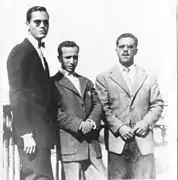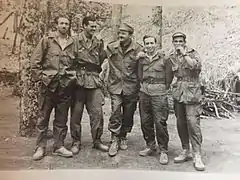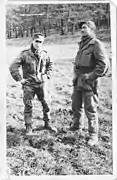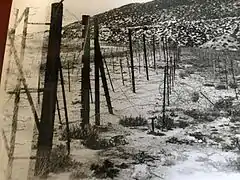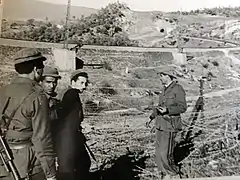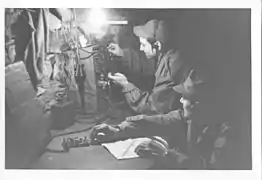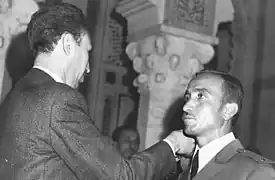Djelloul Khatib
Djelloul Khatib alias commandant Djelloul (8 October 1936 – 6 February 2017)[1][2] was a combatant for the Algerian independence and a public servant. During the war of independence he led the efforts towards the professionalization of the National Liberation Army (NLA). He contributed thereafter to building the civil service of newly independent Algeria.[3]
Djelloul Khatib | |
|---|---|
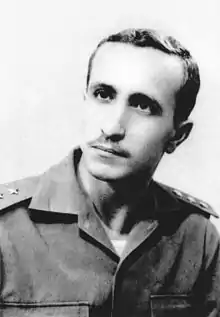 | |
| Chief of Staff of the Ministry of Defence | |
| In office 27 September 1962 – 19 June 1965 | |
| Preceded by | Position established |
| Succeeded by | Colonel Abdelkader Chabou |
| Chief of Staff of the President of the Republic | |
| In office 19 June 1965 – 14 October 1970 | |
| Preceded by | Position established |
| Succeeded by | Doctor Amir Benaïssa |
| Governor of Batna | |
| In office 1973–1976 | |
| Governor of Constantine | |
| In office 1976 – 30 November 1980 | |
| Preceded by | Amal Akbi |
| Succeeded by | Chaabane Ait-Abderrahim |
| Governor of Oran | |
| In office 1 December 1980 – 11 January 1982 | |
| Succeeded by | Mohamed Rachid Merazi |
| Secretary of State in Charge of the Civil Service | |
| In office 12 January 1982 – 22 January 1983 | |
| Preceded by | Position established |
| Ambassador to Argentina | |
| In office 23 January 1984 – 1 January 1988 | |
| Ambassador to Spain | |
| In office 2 January 1988 – 20 September 1989 | |
| Personal details | |
| Born | Djelloul Khatib 8 October 1936 Algiers, Algeria |
| Died | 6 February 2017 (aged 80) |
| Political party | National Liberation Front |
| Military service | |
| Branch/service | |
| Years of service |
|
| Rank | Commandant |
| Battles/wars | Battle of Algiers (1956–57) Suez Crisis Algerian war of independence |
| Awards | Ordre du merite national Orden del libertador San Martín |
War of Independence
Djelloul Khatib hails from the Casbah of Algiers. In 1956 he participated as a young freedom fighter to the battle of Algiers. He was then transferred to Egypt by the National Liberation Army (NLA) to attend military school. The Suez Crisis broke out just as he reported for duty in Cairo; he was mobilized and participated to the combats in Port-Said.
He was assigned thereafter to the NLA Eastern base[4] along the Algeria-Tunisian border and was promoted to the rank of officer. He then joined the First Supply Company which was tasked with channeling arms and ammunition from the Tunisian border to the mountainous region of Kabylia where the fighting was particularly intense.
During his back and forth crossing the morice line he acted as liaison officer between the NLA general staff and the combat units of the Aures region (also called Wilaya I) and Kabylia (Wilaya III). One of his initial missions was to link with Colonel Amirouche, considered a hero of the independence war. As part of the efforts to increase the international visibility of the struggle for independence, Khatib helped in securing the transfer of media reporters from the Tunisian border to the combat units of the interior. In particular he worked with BBC reporter and Oxford scholar Nevill Barbour,[5] with Stevan Labudovic[6] from the Yugoslav media agency Filmske Novosti, with German war photographer Dirk Alvermann[7] and with Italian journalist from the Europeo Magazine, Nino Pulejo.[8] He also helped building up, together with other young officers, the LNA radio communication team.[9]
By 1958 Djelloul Khatib was named Secretary General of the NLA’S Northern Zone Staff and subsequently of the NLA General Staff,[10] under the direct command of Houari Boumediene. During the remaining years of war he led, together with other fellow officers such as Abdelkader Chabou and Slimane Hoffman, the efforts to professionalize the Liberation Army and to strengthen the support bases required to maintain the struggle for independence.[11] He became during these years a close advisor to Boumediene.

Politics
Chief of Staff of the Ministry of Defense and of the Presidency
Once Algerian independence was achieved, Khatib at the age of 26, was appointed as Chief of Staff of the Ministry of Defence (1962-1965) and then Chief of Staff of the Presidency (1965-1970).[12][13] He was tasked by Boumediene, then President of the country, to drive a number of defining initiatives of his administration.
Djelloul Khatib set up the Comedor,[14] a think tank in charge of developing the urban planning of the capital city of Algiers and to which contributed world renowned architects such as Oscar Niemeyer. Khatib also organized the transfer back to the homeland of the ashes of the Emir Abdelkader, an early leader against France colonial invasion in the mid-19th century who died in exile in Damascus.
Khatib also managed the negotiations that led to the signature of the Franco-Algerian agreement of 1968 – which regulates, until now, much of the administrative links between both countries.
He was one of the decision makers that made possible the success of the Algiers panafrican festival of 1969. Khatib was also tasked by President Boumediene to organize the visits to Algiers of personalities such as the Che Gueverra or Senator Edward Kennedy.[15] The meeting with the latter helped prepare the ground for a longstanding partnership between the United States and Algeria in the Hydrocarbons sector.
Oscar Niemeyer
As head of the Comedor, Khatib worked intensely with Oscar Niemeyer.[16] This collaboration made possible the construction of a number of high-profile architectural projects such as the first university since the independence of Algeria in Constantine.[17][18] Other projects resulting from this cooperation are today, even if not executed, an essential part of Oscar Niemeyer's legacy (Algiers mosque, Algiers Civic Center).[19][20][21][22]
Governor
Khatib was appointed Wali (Governor) of Batna (1973-1976), Constantine – the third largest city of the country (1976-1980)[23][24] and Oran – the second largest city of the country (1980-1982).[25]
Secretary of State in Charge of the Civil Service
He was named Secretary of State in charge of the Civil Service (1982-1984). During his tenure, he was charged by Prime Minister Abdelghani[26] to coordinate the visit of George H. W. Bush in 1983, the first one of a Vice-President of the United States to Algeria.
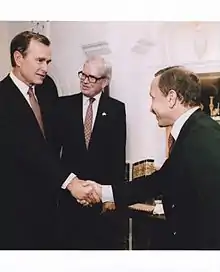
Ambassador
Djelloul Khatib was then appointed Ambassador to Argentina (1982-1984).[27] He intensified economic and technical collaboration between both countries, particularly in civil nuclear power. These efforts led by 1989 to the construction in Algeria of the NOUR nuclear research reactor. As a mark of gratitude for strengthening the ties between Argentina and Algeria, President Raul Alfonsin, awarded him with the "es:Orden del Libertador San Martín".[28]
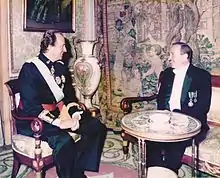
He was then posted as Ambassador to Spain[29] between 1988 and 1989. There he marshalled the support to build the Maghreb–Europe gas pipeline between Algeria, Morocco and Spain. He also facilitated informal peace talks on the Basque conflict.[30]
References
- "L'ancien moudjahid Djelloul Khatib inhumé au cimetière d'El-Alia". Algérie Presse Service. 9 February 2017. Archived from the original on 14 February 2017. Retrieved 16 February 2017.
- "Décès du moudjahid Djelloul Khatib". Radio Algérie. 7 February 2017. Archived from the original on 17 February 2017. Retrieved 16 February 2017.
- "Le Président Bouteflika : Djelloul Khatib a voué sa vie au service du pays et à son édification". Radio Algerie. 8 February 2017. Archived from the original on 16 February 2017. Retrieved 16 February 2017.
- Maarfia, Mohamed (6 March 2012). "Le Matin D'Algérie". L’histoire mouvementée de la Base de l’Est.
- Barbour, Nevill (1921–1963). "Nevill Barbour Collection. St Antony's College. University of Oxford" (PDF). www.sant.ox.ac.uk/research-centres/middle-east-centre. Middle East Centre, St Antony's College, Oxford. OX2 6JF.
- "Algérie-Monténégro: hommage au cameraman de la Révolution Stevan Labudovic". Archived from the original on 31 October 2016.
- Alvermann, Dirk (2011). Algerien. Göttingen, Germany: Steidl. ISBN 978-3-86930-255-3.
- "Ho Vissuto due mesi con i rebelli algerini". L'Europeo. 25 August 1957, p 29-35.
- Chebila, Mohamed (14 February 2012). "Barrage électrifié à la frontière algéro-tunisienne. Les maquisards face à la théorie du champ clos". Archived from the original on 27 October 2017.
- Bendjedid, Chadli (2012). Mémoires, tome 1: 1929-1979. Algiers: Casbah éditions. pp. 171, 214. ISBN 978-9961-64-933-6.
- Cherif, Mahdi (14 June 2010). "48ème anniversaire de l'indépendance : Une documentation sur les combattants de l'ALN". Réflexion DZ.
- "Le secrétaire général de l'état major de l'ANP revient sur le coup d'état manqué de 1967". 22 October 2011. Archived from the original on 24 September 2016.
- "Décret du 14 octobre 1970". Journal officiel de la république algérienne. 6 novembre 1970, p. 1051.
- "Alger : Perception de soi, regard de l'autre". Insaniyat / إنسانيات (5): 127–131. May 1998. doi:10.4000/insaniyat.12321.
- "This November 20, 1966 file photo shows Algerian President Houari Boumediene (L) with US Senator Edward M. Kennedy in Algiers". US Senator Ted Kennedy. Getty Image/AFP. 20 November 1966. Archived from the original on 21 October 2016.
- Niemeyer, Oscar (1974). « Lettre au Commandant Djelloul, Secrétaire général à la Présidence du Conseil, Alger », 3 octobre 1969, cf. Arnold Whittick, Encyclopedia of Urban Planning. New York: Mc Graw-Hill.
- "University of Constantine". www.en.wikiarquitectura.com.
- "University of Constantina". Jcjovine. 21 September 2023.
- Bouchène, Yasmine. "Diaporama des projets inachevés d'Oscar Niemeyer en Algérie". vinyculture.com.
- "Centro Cívico de Argel". Fundaçao Oscar Niemeyer.
- Niemeyer, Oscar (1976). Arquitectura brasileira na Argelia. Rio de Janeiro – via http://www.niemeyer.org.br/obra/pro152.
{{cite book}}: External link in|via= - "Fundação Oscar Niemeyer - Mesquita de Argel". Fundaçao Oscar Niemeyer.
- "Les préfets et walis de Constantine". Constantine hier et aujourd'hui.
- "Le Wali de Constantine à "El-Djeich" (PDF). El-Djeich, revue de l'armée nationale populaire. Mars 1980.
- "Décret du premier décembre 1980". Journal officiel de la république algérienne. 30 decembre 1980, p. 1309.
- "Décret 88-17 du 12 janvier 1982". Journal officiel de la république algérienne. 19 javier 1982, p. 67.
- "Décret du 2 janvier 1988". Journal officiel de la république algérienne. 27 janvier 1988, p. 410.
- "1988 1ra sección". Boletín oficial de la república argentina. 16 November 1988.
- "Décret du 20 septembre 1989". Journal officiel de la république algérienne. 1er novembre 1989, p. 1033.
- "Argelia no mediará en el diálogo del Gobierno con ETA". 7 February 1988.
